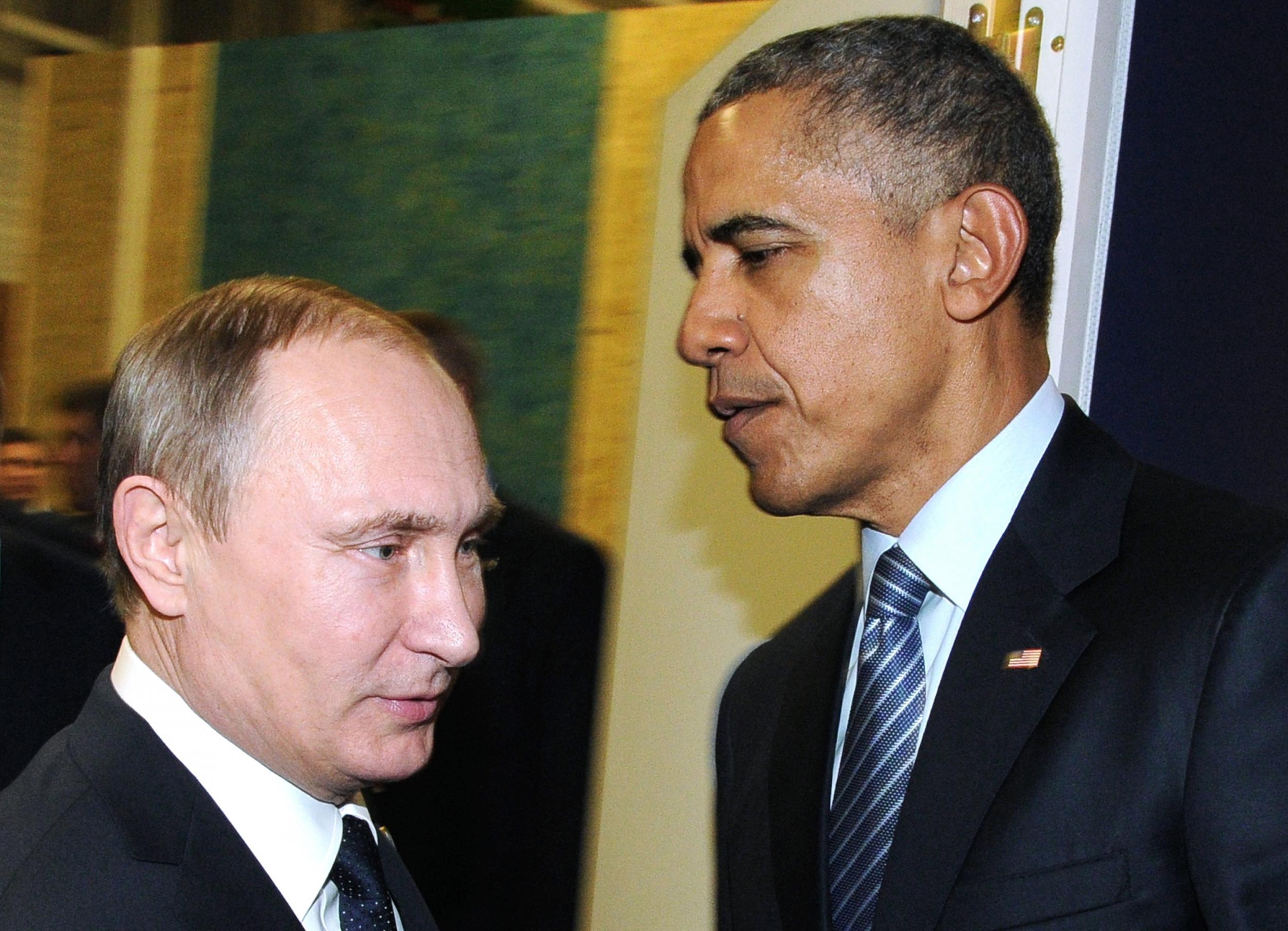Vladimir Putin 'making refugee crisis worse to undermine Europe'
Barack Obama called Vladimir Putin on Sunday evening urging him to cease bombing 'moderate' rebels in Syria

Your support helps us to tell the story
From reproductive rights to climate change to Big Tech, The Independent is on the ground when the story is developing. Whether it's investigating the financials of Elon Musk's pro-Trump PAC or producing our latest documentary, 'The A Word', which shines a light on the American women fighting for reproductive rights, we know how important it is to parse out the facts from the messaging.
At such a critical moment in US history, we need reporters on the ground. Your donation allows us to keep sending journalists to speak to both sides of the story.
The Independent is trusted by Americans across the entire political spectrum. And unlike many other quality news outlets, we choose not to lock Americans out of our reporting and analysis with paywalls. We believe quality journalism should be available to everyone, paid for by those who can afford it.
Your support makes all the difference.Barack Obama has phoned Vladimir Putin in a desperate attempt to hold together the Syrian peace deal as Russia launched major airstrikes in the region and Putin was accused of exacerbating the refugee crisis to undermine the European project.
As world leaders scrambled to prevent a Syrian ceasefire from collapsing, the US President contacted the Russian President on Sunday night to urge him to stop bombing “moderate” rebels in the war-torn region in support of its Syrian ally, President Bashar al-Assad.
The White House said: “President Obama emphasised the importance now of Russia playing a constructive role by ceasing its air campaign against moderate opposition forces in Syria.” The Kremlin added that they had a “frank and business-like” discussion with Mr Obama.
Major powers agreed on Friday to a limited cessation of hostilities in Syria, but the deal does not take effect until the end of this week and was not signed by any warring parties - the Damascus government and numerous rebel factions fighting it. The ceasefire would exclude military operations against the so-called Islamic State terror group.
There is little optimism, however, that the deal will do much to end a war that has lasted five years and cost around 250,000 lives.
Russian bombing raids directed at rebel groups are helping the Syrian army to achieve what could be its biggest victory of the war in the battle for Aleppo, the country's largest city and commercial centre before the conflict.
The intensified air campaign follows accusations from Senator John McCain, chairman of the US Senate armed services committee, that Russian President Vladimir Putin was intentionally stoking the refugee crisis in order to undermine the European project.
The International Rescue Committee added that more than 40,000 had fled the countryside of northern Aleppo province in the past two weeks, crowding into towns near the Turkish border.
Speaking on the final day of the annual Munich security conference Mr McCain accused Moscow of using its aerial campaign in Syria to add to the flow of people feeling the Middle East.
“He [Mr Putin] wants to exacerbate the refugee crisis and use it as a weapon to divide the transatlantic alliance and undermine the European project,” he said, “His appetite is growing with the eating".
Senator’s McCain’s concerns come amid reports that some Turkish soldiers have entered Syria over the weekend. Turkish Defence Minister Ismet Yilmaz, however, denied the report and said Ankara was not considering sending troops into its neighbour, the state-run Anadolu Agency reported.
Syria's government had said Turkish forces were believed to be among 100 gunmen who entered Syria on Saturday with 12 pick-up trucks mounted with heavy machine guns, in an operation to supply insurgents fighting Damascus.
Senator McCain added that Mr Putin "is not interested in being our partner. He wants to shore up the Assad regime. He wants to re-establish Russia as a major power in the Middle East."
"This is diplomacy in the service of military aggression and it's working because we are letting it.”
On Saturday, Russian Prime Minister Dmitry Medvedev told the Munich conference there was no evidence that Russia was bombing Syrian civilians.
Additional reporting by Reuters
Join our commenting forum
Join thought-provoking conversations, follow other Independent readers and see their replies
Comments